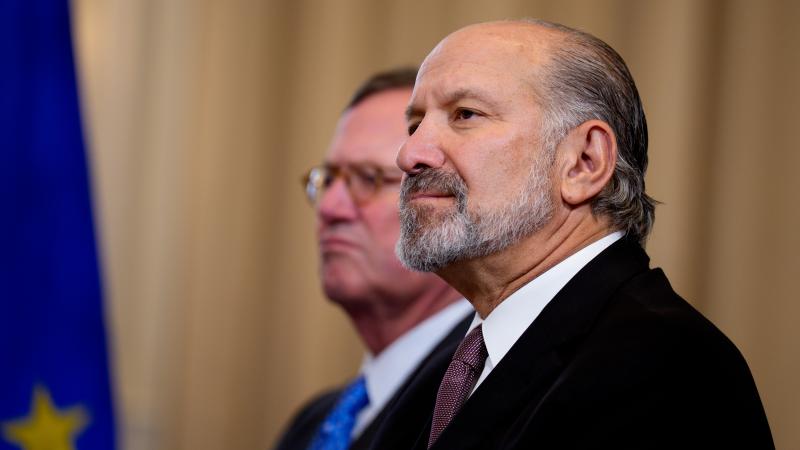Banking industry sounds alarm about Soviet-educated comptroller pick with Marxist ties
Saule Omarova, the Biden nominee for comptroller of the currency, wants to federalize private bank accounts, scrap the FDIC, and bankrupt oil and gas companies.
Banking groups are expressing concerns about President Joe Biden's nominee for comptroller of the currency, Saule Omarova, a Soviet-educated Cornell University law professor with Marxist ties, who has been tapped to lead the agency responsible for regulating America's banks.
Omarova is the product of an academic background unusual in a nominee for high executive office in the U.S. government: As a native Kazakh citizen of the USSR, she attended Moscow State University on a Lenin Scholarship before the fall of the Soviet Union.
In 2019, the Moscow-educated nominee contrasted market economics unfavorably with the USSR's command economy on Twitter.
Earlier this year Omarova was caught on video rooting for the bankruptcy of companies in the oil and gas industries. Calling oil and gas "troubled industries," she forecast the failure of "a lot of the small players" in the sector. "At least, we want them to go bankrupt if we want to tackle climate change, right?" she said.
In reaction to the comments, Texas Gov. Greg Abbott fired off a blistering letter Tuesday to Biden. "Neither a president, nor his appointees, should advocate for the bankruptcy of American businesses," Abbott wrote. "As Governor of the largest oil and gas producing state in the United States, I call on you to immediately withdraw the nomination of Saule Omarova for Comptroller of the Currency."
But the source of greatest alarm within the banking industry is a 71-page paper published by the Vanderbilt Law Review in which Omarova proposes drastic changes to the nation's dual banking system, which has been in place since 1863.
The U.S. dual banking system regulates banks through state or federal charters and regulations. Banks apply for a national charter through the Office of the Comptroller of the Currency (OCC) or a state charter through a state banking department.
As of the second quarter of 2021, there were 4,791 community banks that are state chartered nationwide, Bankingstrategist.com, representing 97% of banks. Roughly half, 2,371, are headquartered in smaller, rural counties with populations of less than 50,000. Texas and Illinois have the most community banks, 392 and 391, respectively, followed by Minnesota (268), Iowa (266), Missouri (233) and Kansas (219).
Omarova's proposal would upend this system — impacting rural communities the most.
In her paper, she proposes "replacing commercial bank reserve accounts with universally available deposit accounts" to "allow all U.S. citizens and law-abiding citizens and lawful residents, local governments, nonbanking firms and nonbusiness entities to open transactional accounts directly with the Federal Reserve, thus bypassing private depository institutions."
She says the most effective way to implement the accounts would be to transition all deposits to the Fed. FedAccounts would be opened upon birth or naturalization — and credited automatically with regularly received federal benefits, she proposes.
The Federal Reserve would also take out money from these accounts when its monetary policy fails, she suggests; when it determines "that it is necessary to expand the money supply in order to stimulate economic activity and ensure better utilization of the national economy's productive capacity."
In other words, when adjusting interest rates or printing money and devaluing the dollar and going into more debt doesn't stimulate economic activity — the Fed could just take money out of Americans' bank accounts.
Omarova also proposes eliminating the Federal Deposit Insurance Corporation, which was founded during the Great Depression in the wake of widespread banking collapse. After the stock market crash of 1929, a series of bank panics in 1930 and 1931 led to more than 4,000 American banks collapsing and depositors losing $1.3 billion. The1933 Glass-Steagall Act created the FDIC, which for the first time extended federal oversight to all commercial banks and insured commercial bank deposits.
In 2011, the Dodd-Frank banking bill, signed into law by President Obama, raised the FDIC deposit insurance limit to $250,000 per account, and expanded the FDIC's responsibility.
Under the Omarova plan, the FDIC would "have no practical role to play."
Omarova's proposal would "undermine the valuable role community banks play in their communities," argues the American Bankers Association, which represents the nation's largest banks.
"To abolish the FDIC as deposit insurer and supervisor of state-chartered institutions," it adds, would "effectively end the dual banking system and break up regional and large banking organizations."
"We have serious concerns about her ideas for fundamentally restructuring the nation's banking system, which remains the most diverse and competitive in the world," said American Bankers Association President and CEO Rob Nichols. "Her proposals to effectively nationalize America's community banks, end regulatory tailoring based on risk and eliminate the dual banking system are particularly troubling."
Independent Community Bankers of America (ICBA) President and CEO Rebeca Romero Rainey has similar concerns. Omarova's plan "would displace locally based community banking and restrict economic growth in local communities," she said.
ICBA-represented banks employ more than 700,000 people, hold more than $5.8 trillion in assets, over $4.8 trillion in deposits, and more than $3.5 trillion in loans to consumers, small businesses and the agricultural community. Community banks "channel local deposits into the Main Streets and neighborhoods they serve, spurring job creation, fostering innovation and fueling their customers' dreams in communities throughout America," ICBA says.
Omarova rejects allegations that she embraces communist ideology.
"My grandmother was orphaned because Stalin sent her entire family to Siberia, and they died there," she told the Financial Times. "Her family was destroyed because they were educated Kazakhs who didn't join the party."
She writes the criticism off to assorted varieties of bigotry. "I am an easy target," she said. "An immigrant, a woman, a minority. I don't look like your typical comptroller of the currency. I have a different history. I am easy to demonize and vilify."
In response to the Senate Banking Committee requesting a copy of her Moscow State University thesis, "Karl Marx's Economic Analysis and the Theory of Revolution in The Capital," to review, Omarova declined.
A Moscow State University official told The Daily Mail it retains such works for only five years. Her thesis "was destroyed long ago," the official said. "We do not have a copy."
"What I wrote in that paper has nothing to do with what I believed in then or in what I believe in now," Omarova told The Financial Times.
But in 2019, Omarova joined a Facebook group, "Marxist Analysis and Policy," which which says "a culture of diverse Marxist, Socialist and radical views is the framework for the group," American Military News reported.
Before joining Cornell Law School in 2014, Omarova taught law at the University of North Carolina School of Law and practiced law at a New York law firm. In 2006-2007, she worked as a special adviser to the Treasury Department's undersecretary for domestic finance.
Requests for comment through Cornell Law School were not immediately returned.















